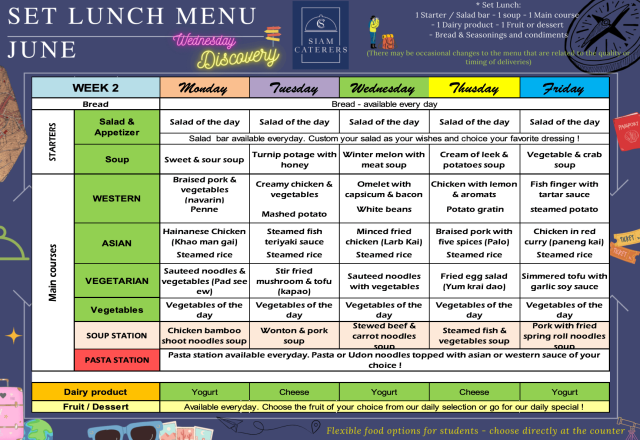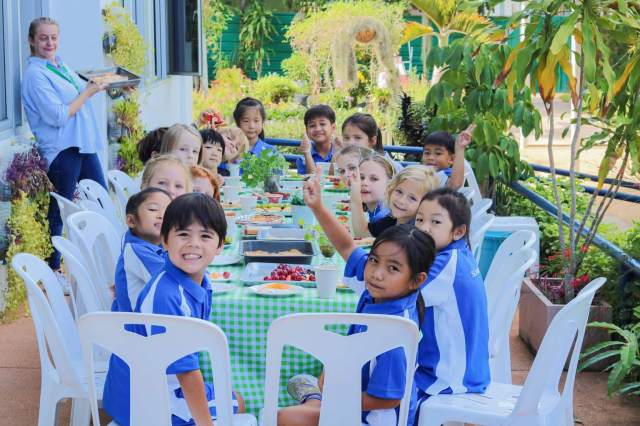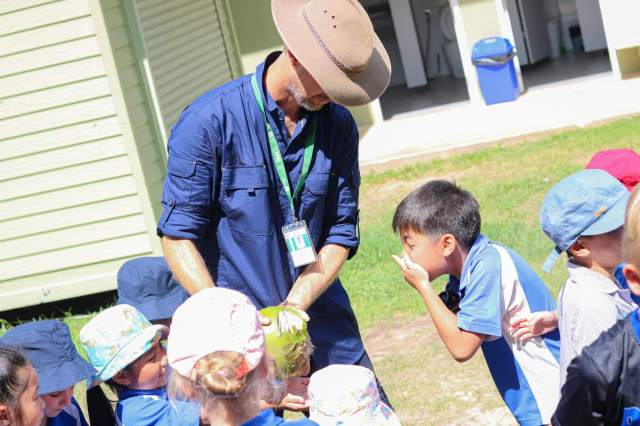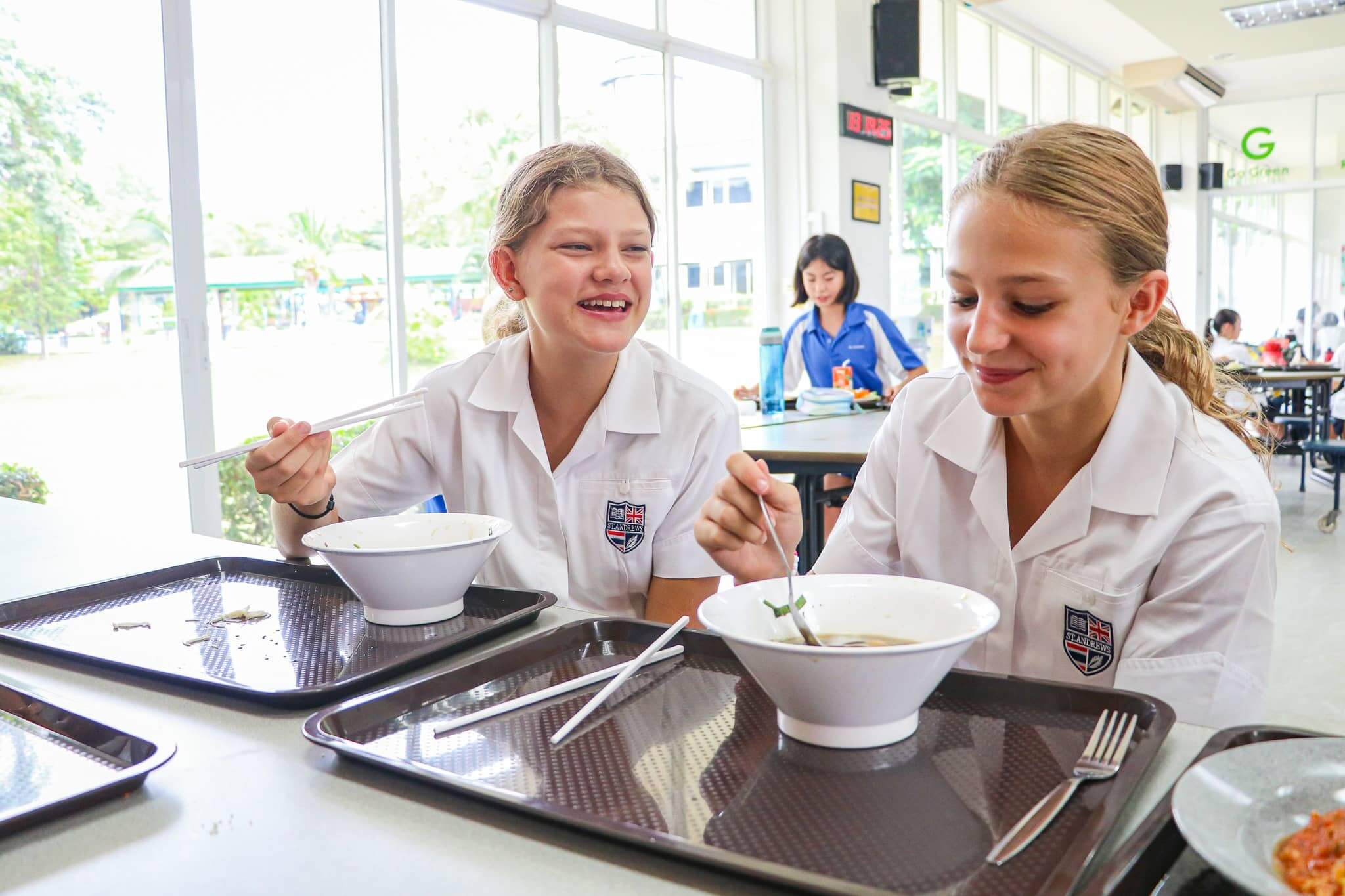Why is school lunch important? What if lunch wasn’t just a break in the day, but part of your child’s education? What if the benefits of school lunch go beyond just a fuel for full bellies during schooltime?
At St. Andrews Green Valley, that’s exactly how we see it. A good meal supports far more than physical growth. It influences how children focus, how they feel, and how they see the world around them. In our canteen, food becomes a foundation for learning, wellbeing, and lifelong habits. Dive in why are school lunches important and let’ us show you the beyond benefits of the school lunch in this article.
- The right food supports whole-child development: Balanced nutrition helps children grow physically, stay focused, and feel emotionally settled. These fundamental is why school lunch is important in general.
- Green Valley takes food seriously: Meals are carefully planned with the nutrients children need to thrive in school and beyond.
- Lunch is treated as part of the learning journey: At St. Andrews Green Valley, we turn mealtimes into meaningful experiences through international menus, cultural exploration, and ingredients grown by our own students. And benefits of school lunches go beyond just fill the stomach.
- Gardening and sustainability build deeper awareness: Our students learn how food connects to the environment, their community, and the impact of their own choices. These experiences strengthen our holistic approach to education and foster meaningful personal growth.
Nutrition as the Foundation of Development
Why is school lunch important? Everything we eat affects the body and mind. It shapes how we grow, think, and feel. In children, nutrition plays a critical role in development across every domain. The right balance of nutrients supports key areas. In children, nutrition plays a critical role in development across every domain.
Physical Development
School lunch adds up to 30 – 35% of a child’s daily energy needs. Food quite literally builds children. Protein, calcium, and key vitamins are essential for strengthening muscles, supporting bone growth, and fuelling active bodies. Without proper nutrition, energy fades, growth slows, and physical development can fall behind. These are some of the most fundamental school lunch benefits supporting the body from the inside out.

Brain Development
For full brain development, children need nutrition as follows:
- 3–4 mg of iron to support oxygen flow
- 100–200 mg of Omega-3s fatty acids (DHA/EPA) for healthy brain development, memory, and focus.
- 200-300 grams of complex carbohydrates per day to provide a slow, stable release of energy to keep children focused throughout the day.
These nutrients work together to support clearer thinking, stronger memory, and better attention. This proves that the benefits of school lunches extend directly into the classroom.

Mental Wellbeing
Hunger and sugar crashes can lead to mood swings and restlessness, while balanced meals with fibre, complex carbs, and essential nutrients help regulate emotions and restore calm. Warm, nourishing food creates a sense of comfort and stability. It helps children feel more settled, more in control, and more ready to engage with the world around them. This is a crucial part of the benefits of school lunches that supports not just the body, but emotional development too.
Global Awareness and Curiosity Through Food
Food is often a child’s first real connection to the wider world. It’s one of the lesser-known yet powerful school lunch benefits. The flavours on a plate can spark curiosity, encouraging awareness of people, places, and cultures beyond their own.
Theme Days that Spark Imagination
What’s for lunch today? It could be Japanese noodles, Greek souvlaki, or something they’ve never even heard of. Our Theme Days bring the globe into the canteen—one flavour at a time. Children don’t just eat new dishes; they hear the stories behind them, broadening their world without even realising it.
Celebrating Cultural Traditions
Food is deeply tied to memory and meaning. That’s why we honour global festivals from Songkran, Lunar New Year, Christmas, and more, with special menus that bring traditions to life. It’s a powerful way for students to feel seen, share pride in their culture, or learn to appreciate someone else’s culture. These cultural experiences show why school lunch is important in nurturing both learning and empathy.

Sustainability, Responsibility, and Wellbeing in Every Bite
Food choices shape more than personal health, they influence habits, values, and the world around us. Through growing, preparing, and eating with care, children begin to understand their role in a larger system that connects wellbeing, community, and the environment.
Awareness, and Growth Through Gardening
When children grow some of the food they eat, something changes. They begin to appreciate the effort behind each bite, understand seasonal cycles, and become more thoughtful about food waste and where ingredients come from.
In our school garden, students plant, tend, and harvest with care. They learn responsibility and patience and that even small actions, such as watering a plant, can have a positive impact on the world.
Social Connection and Emotional Wellbeing
Gardening also builds connection. Students work side-by-side, share tools, and celebrate small successes together—from the first sprout to the final harvest. These quiet moments foster empathy, communication, and teamwork.
The garden also provides calm. The rhythm of nature gives children space to breathe, reflect, and reset—a natural support for their mental health. When it comes to well-being, one of the simplest but most powerful school lunch benefits is giving children a meaningful relationship with the food they eat.
Eating With Intention and Care
Food is never just fuel. It’s a daily opportunity to practise mindfulness, self-regulation, and conscious choice. We talk with students about food waste, nutrition, and plant-forward eating as part of understanding their own impact. This method creates more than environmental awareness for students, it also fosters each child’s sense of purpose and personal agency. These habits highlight why are school lunches important. It can be everything from benefits to health to forming lifelong values.

At a glance, lunch may seem routine. But in the right environment, it becomes a powerful teacher. A balanced, thoughtful meal supports physical health. Furthermore, it nurtures focus, curiosity, responsibility, and emotional well-being.
At St .Andrews Green Valley, we see food as a thread that runs through every part of a child’s learning journey. More than just promoting health, we encourage students to grow their own vegetables, care for the environment, and explore cultural diversity through what’s on their plate. These are just some of the reasons why are school lunches important in the broader context of education. One meal at a time, we help our students grow into thoughtful, healthy, and curious individuals with strong minds and kind hearts. When we understand the full benefits of school lunch, we begin to see lunch not as a break from learning but as part of it.







